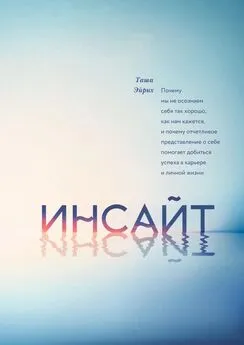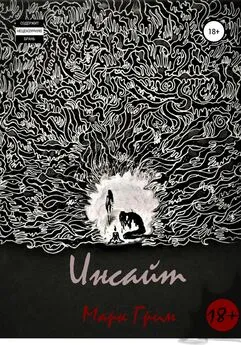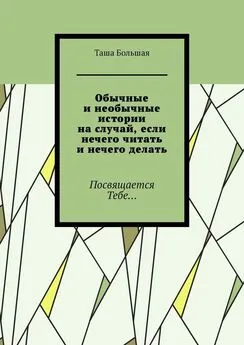Таша Эйрих - Инсайт
- Название:Инсайт
- Автор:
- Жанр:
- Издательство:Манн, Иванов и Фербер
- Год:2018
- Город:Москва
- ISBN:9785001170136
- Рейтинг:
- Избранное:Добавить в избранное
-
Отзывы:
-
Ваша оценка:
Таша Эйрих - Инсайт краткое содержание
Инсайт - читать онлайн бесплатно ознакомительный отрывок
Интервал:
Закладка:
137
Jean M. Twenge, Emodish M. Abebe, and W. Keith Campbell. “Fitting in or standing out: Trends in American parents’ choices for children’s names, 1880–2007.” Social Psychological and Personality Science 1.1 (2010): 19–25.
138
Gina Jacobs. “Unique baby names not just a celebrity fad,” newscenter.sdsu.edu, May 20, 2009, http://newscenter.sdsu.edu/sdsu_newscenter/news_story.aspx?sid=71319.
139
Roy F. Baumeister, et al. “Does high self-esteem cause better performance, interpersonal success, happiness, or healthier lifestyles?” Psychological Science in the Public Interest 4.1 (2003): 1–44.
140
Stanley Coopersmith. The Antecedents of Self-Esteem. Consulting Psychologists Press, 1967.
141
Jean M. Twenge and W. Keith Campbell. The Narcissism Epidemic: Living in the Age of Entitlement. Simon and Schuster, 2009, p. 62.
142
Nathaniel Branden. The Six Pillars of Self-Esteem. Bantam Dell Publishing Group, 1995, p. 5, as cited in Roy F. Baumeister, Laura Smart, and Joseph M. Boden. “Relation of threatened egotism to violence and aggression: The dark side of high self-esteem.” Psychological Review 103.1 (1996): 5.
143
Nathaniel Branden. “In defense of self.” Association for Humanistic Psychology (1984): 12–13, p. 12, as cited in Roy F. Baumeister, Laura Smart, and Joseph M. Boden. “Relation of threatened egotism to violence and aggression: The dark side of high self-esteem.” Psychological Review 103.1 (1996): 5–33.
144
Andrew M. Mecca, Neil J. Smelser, and John Vasconcellos. The Social Importance of Self-Esteem. University of California Press, 1989, p. 105.
145
Andrew M. Mecca, Neil J. Smelser, and John Vasconcellos. The Social Importance of Self-Esteem. University of California Press, 1989, p. 105.
146
Will Storr. “The man who destroyed America’s ego,” medium.com, February 25, 2014, https://medium.com/matter/the-man-who-destroyed-americas-ego-94d214257b5#.dasai1u4q.
147
Martin M. Chemers, Carl B. Watson, and Stephen T. May. “Dispositional affect and leadership effectiveness: A comparison of self-esteem, optimism, and efficacy.” Personality and Social Psychology Bulletin 26.3 (2000): 267–277.
148
Duane Buhrmester, et al. “Five domains of interpersonal competence in peer relationships.” Journal of Personality and Social Psychology 55.6 (1988): 991–1008.
149
Julia A. Bishop and Heidi M. Inderbitzen. “Peer acceptance and friendship: An investigation of their relation to self-esteem.” Journal of Early Adolescence 15.4 (1995): 476–489.
150
D. R. Forsyth and N. A. Kerr. “Are adaptive illusions adaptive.” Poster presented at the annual meeting of the American Psychological Association, Boston, MA (1999), cited in Baumeister et al., 1996.
151
Roy F. Baumeister, et al. “Does high self-esteem cause better performance, interpersonal success, happiness, or healthier lifestyles?” Psychological Science in the Public Interest 4.1 (2003): 1–44.
152
Roy F. Baumeister, et al. “Does high self-esteem cause better performance, interpersonal success, happiness, or healthier lifestyles?” Psychological Science in the Public Interest 4.1 (2003): 1–44.
153
Baumeister et al. “Relation of threatened egotism to violence and aggression: The dark side of high self-esteem.” Psychological Review 103.1 (1996): 5–33.
154
Caryl E. Rusbult, Gregory D. Morrow, and Dennis J. Johnson. “Self-esteem and problem-solving behaviour in close relationships.” British Journal of Social Psychology 26.4 (1987): 293–303.
155
Thalma E. Lobel and Ilana Levanon. “Self-esteem, need for approval, and cheating behavior in children.” Journal of Educational Psychology 80.1 (1988): 122–123.
156
Meg Gerrard, et al. “Self-esteem, self-serving cognitions, and health risk behavior.” Journal of Personality 68.6 (2000): 1177–1201.
157
Richard Adams. “Headteacher whose praise for pupils went viral falls foul of Ofsted,” theguardian.com, September 24, 2015, http://www.theguardian.com/education/2015/sep/24/headteacherwhose-praise-for-pupils-went-viral-falls-foul-of-ofsted.
158
Zole O’Brien. “Children are never naughty, says head,” express.co.uk, June 28, 2015, http://www.express.co.uk/news/uk/587459/Children-teachers-bad-behaviour.
159
Allison Pearson. “Sparing the rod has spoilt these teachers,” telegraph.co.uk, June 30, 2015, http://www.telegraph.co.uk/education/primaryeducation/11707847/Allison-PearsonSparing-the-rod-has-spoilt-these-teachers.html.
160
Журналист Эллисон Пирсон рисует весьма интересную картину того, что произошло бы, если бы такая философия применялась в сфере дипломатических отношений Великобритании в период Второй мировой войны: Дорогой господин Гитлер! Вы исчерпали наше терпение. Пожалуйста, отдайте назад Польшу, или это серьезно скажется на нашем благополучии. С любовью, Британия .
161
Allison Pearson. “Sparing the rod has spoilt these teachers,” telegraph.co.uk, June 30, 2015, http://www.telegraph.co.uk/education/primaryeducation/11707847/Allison-PearsonSparing-the-rod-has-spoilt-these-teachers.html.
162
Ключевой этап 2 — период в школьном образовании, объединяющий учебные годы с 3-го по 6-й. Прим. пер. .
163
“Barrowford school’s KS2 ‘proud’ letter to pupils goes viral,” bbc.com, July 16, 2014, http://www.bbc.com/news/ukengland-lancashire-28319907.
164
Jaya Narain. “Inspectors slam primary school where there’s no such thing as a naughty child and teachers are banned from raising their voices — and give it Ofsted’s lowest possible rating,” dailymail.co.uk, September 25, 2015, http://www.dailymail.co.uk/news/article-3249078/Inspectors-slam-primary-school-s-no-thing-naughty-child-teachersbanned-raising-voices-Ofsted-s-lowest-possible-rating.html.
165
Jaya Narain. “Inspectors slam primary school where there’s no such thing as a naughty child and teachers are banned from raising their voices — and give it Ofsted’s lowest possible rating,” dailymail.co.uk, September 25, 2015, http://www.dailymail.co.uk/news/article-3249078/Inspectors-slam-primary-school-s-no-thing-naughty-child-teachersbanned-raising-voices-Ofsted-s-lowest-possible-rating.html.
166
Ashley Merryman. “Losing is good for you,” nytimes.com, September 24, 2013, http://www.nytimes.com/2013/09/25/opinion/losing-is-good-for-you.html?_r=0.
167
Dilvin Yasa. “Has the self-esteem movement failed our kids,” childmags.com.au, September 22, 2014, http://www.childmags.com.au/family/relationships/6766-has-the-self-esteemmovement-failed-our-kids.
168
William Turvill. “School bans red ink — and tells teachers to mark in green instead (and get pupils to respond in purple),” dailymail.co.uk, March 19, 2014, http://www.dailymail.co.uk/news/article-2584672/School-bans-red-ink-tells-teachers-mark-green-inst.
169
Richard Lee Colvin. “Losing faith in self-esteem movement,” latimes.com, January 25, 1999, http://articles.latimes.com/1999/jan/25/news/mn-1505.
170
Frank Bruni. “Common core battles the cult of self-esteem,” dallasnews.com, December 1, 2013, http://www.dallasnews.com/opinion/latest-columns/20131201-common-core-battles-the-cult-ofself-esteem.ece.
171
Valerie Strauss. “Why grade inflation (even at Harvard) is a big problem,” washingtonpost.com, December 20, 2013, https://www.washingtonpost.com/news/answer-sheet/wp/2013/12/20/why-gradeinflation-even-at-harvard-is-a-big-problem/?utm_term=.6b4ef3d0ee6d.
172
В американской системе оценивания знаний оценки А и А+ соответствуют 5 баллам. Прим. ред. .
173
Matthew Q. Clarida and Nicholas P. Fandos. “Substantiating fears of grade inflation, dean says median grade at Harvard College is A-, most common grade is A,” thecrimson.com, December 4, 2013, http://www.thecrimson.com/article/2013/12/3/grade-inflation-mode-a/.
174
Kristin Touissant. “Harvard class with A-average not worried about grade inflation,” boston.com, May 27, 2015, http://www.boston.com/news/local-news/2015/05/27/harvard-class-witha-average-not-worried-about-grade-inflation.
175
Robert McGuire. “Grade expectations,” yalealumnimagazine.com, September/October 2013, https://yalealumnimagazine.com/articles/3735.
176
Richard W. Robins and Jennifer S. Beer. “Positive illusions about the self: Short-term benefits and long-term costs.” Journal of Personality and Social Psychology 80.2 (2001): 340–352.
177
C. Randall Colvin, Jack Block, and David C. Funder. “Overly positive self-evaluations and personality: negative implications for mental health.” Journal of Personality and Social Psychology 68.6 (1995): 1152, 1156.
178
C. Randall Colvin, Jack Block, and David C. Funder. “Overly positive self-evaluations and personality: negative implications for mental health.” Journal of Personality and Social Psychology 68.6 (1995): 1152–1162.
179
Keith M. Hmieleski and Robert A. Baron. “Entrepreneurs’ optimism and new venture performance: A social cognitive perspective.” Academy of Management Journal 52.3 (2009): 473–488.
180
Arnold C. Cooper, Carolyn Y. Woo, and William C. Dunkelberg. “Entrepreneurs’ perceived chances for success.” Journal of Business Venturing 3.2 (1988): 97–108.
181
Thomas Åstebro and Samir Elhedhli. “The effectiveness of simple decision heuristics: Forecasting commercial success for early-stage ventures.” Management Science 52.3 (2006): 395–409.
182
На протяжении всей книги цитаты единорогов самоосознания приводятся почти дословно; я внесла несколько небольших изменений, для того чтобы повысить читабельность этих цитат, не меняя при этом их смысл.
Читать дальшеИнтервал:
Закладка:




![Таша Танари - Подарить душу демону [publisher: ИДДК]](/books/1073950/tasha-tanari-podarit-dushu-demonu-publisher-iddk.webp)
![Таша Танари - Испытать силу демона [publisher: ИДДК]](/books/1073951/tasha-tanari-ispytat-silu-demona-publisher-iddk.webp)




